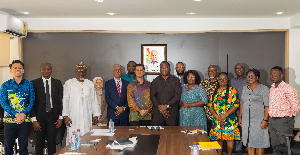Deputy Minister for Tourism, Culture and Creative Arts Hon Yussif Issaka Jajah, has thrown his weight behind the push to develop a Halal-compliant tourism and hospitality sector in Ghana, noting that Halal standards can attract a wide range of visitors, including non-Muslims, due to their high quality and moral appeal.
Speaking during a meeting with a Malaysian delegation and local Halal stakeholders in Accra, the Deputy Minister said: “You’ll get traffic when you start Halal-compliant hotels. Even Christians will participate. It’s not just a religious issue, it’s a business opportunity.”
He encouraged the Bureau of Halal Certification Ghana (BHCG) to begin engaging hoteliers and food providers who may be willing to adopt Halal standards, while the formal certification structures are being finalized. “Start building some few Halal-compliant hotels. Once that infrastructure is in place, people will come,” he added.
He made the statement during a courtesy call by the Halal Development Corporation (HDC) Malaysia, the Malaysian High Commission, JAKIM Malaysia, and the BHCG aimed at exploring potential collaboration towards developing a Halal ecosystem in Ghana.
‘President Mahama is the most loved man in Burkina Faso after Traoré’ – Wode Maya
The discussions focused on leveraging Ghana’s Tourism and Cultural assets to attract Halal-conscious travelers, promote Halal-compliant hospitality services, and establish a regulatory framework to support certification and enhance international recognition. This initiative is envisioned to position Ghana as a preferred Halal tourism destination in the region.
Fann Mur Ashira of HDC Ghana clarified that the Bureau of Halal Certification Ghana, established in 2023, is leading efforts to formalize Halal standards in the country with support from the Office of the President and other government agencies. The aim is to ensure Ghana is positioned to benefit from the growing global Halal market, estimated at over $2 trillion.
Paja Api Amiepul, speaking on behalf of the Malaysian High Commissioner, emphasized Malaysia’s global leadership in Halal tourism and its readiness to support Ghana through training, certification frameworks, and investment attraction. He noted that Ghana’s vibrant culture, history, and hospitality make it a strong candidate to become a Muslim-friendly travel destination.
Mr. Samudeen Yusif of BHCG echoed this, adding that the initiative goes beyond food and into pharmaceuticals, wellness, cosmetics, and media. He highlighted the need for public education and government support to guide businesses on Halal compliance.
The meeting concluded with a commitment from both sides to deepen collaboration and roll out Ghana’s Halal certification and Tourism program in phases, starting with hospitality and food service sectors.



